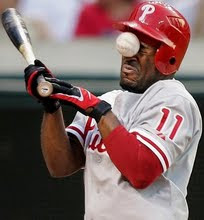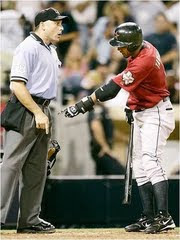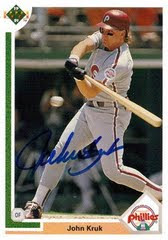Before looking at Pujols' best possible suitors, let's first analyze whether Alex Rodriguez is a good contracts negotiation point comparable. Last season, per Fangraphs, Pujols was "only" worth +7.3 WAR, the second worst single-season performance of his career. His "puny" WAR total qualified as third best amongst all major league hitters last year, behind only Josh Hamilton (+8.0 WAR) and Joey Votto (+7.4 WAR). In fact, the only other players in baseball last season to even crack the +7.0 WAR mark last season were Ryan Zimmerman (+7.2 WAR) and Adrian Beltre (+7.1 WAR). Exclusive company, to say the least. Alex Rodriguez (+3.9 WAR) didn't even crack the +4.0 WAR plateau last season.
In the four seasons prior to 2010, each of which was marred by some medley of limiting injuries which frequently required offseason surgey, Pujols posted WAR total of +8.3 or higher. From 2008-2009, Pujols accumulated +18.0 WAR. The dollar value of a win over the past three seasons has been approximately $4.5 million. Applying this total to Pujols' past three year WAR value of +25.3 WAR, Pujols produced at a clip worth approximately $113.85 million. Let's be pessimistically conservative and round that total down to a flat $100 million. Considering that Pujols made less than half of that total over the past three seasons ($48 million), you can understand why the best right handed hitter in baseball, wants to share in the profits. Pujols will make $16 million in 2011 and estimates of this offseason's dollar value per win peg a single win-above-replacement at $5 million. Hence Pujols would only have to produce a +3.2 WAR clip to be worth his salary. His career low in single season WAR is +5.7, from his sophomore season. Yeah, this guy is worth some money.
By comparison, let's look at Alex Rodriguez's value heading into his record-setting $275 million dollar contract. No one doubts that Alex Rodriguez was one of the best shortstops of all time (sorry, Derek Jeter, but it was you who should have slid over to third base) and, even as a third basemen, he has been one of the best players in baseball. However, when we compare Arod's WAR to Pujols' WAR, keep in mind that the positional adjustment differential is about 1.5 wins per season in favor of Arod.
In the three seasons prior to signing his massive contract with the Yankees (opting out of his current deal), Alex Rodriguez was worth a cumulative +22.9 WAR, despite playing the better position. While Pujols had the better three-year WAR total, Arod had the better two-of-three seasons, being worth +9.2 WAR in 2007 and +9.4 WAR in 2005. Arod had a real stinker of a season in 2006 by Arod standard, posting a "meager" +4.3 WAR campaign (still all-star caliber season, no matter what the New York media proclaimed at the time). In the three years prior to signing his record-setting contract, Alex Rodriguez accrued +172.3 batting runs over the three seasons prior, while playing below-average defense at third base (-15.7 2005-07 UZR, -2.9 career UZR/150 at third). Alex Rodriguez was 32 years old at the time he signed his behemoth deal. In the three years since, Arod has had a squeaky hip and accumulated a cumulative +14.4 WAR for the Yankees.
Albert Pujols, likewise, will be 31 when he hits free agency. He has out hit (+200.8 batting runs) and outfielded (+5.9 three-year UZR, albeit at first base) Alex Rodriguez in the three-year sample preceding his massive contract. Granted, Albert Pujols still has 2011 to "show what he's worth," but it's unlikely that Pujols, barring some unforeseen injury, will post a WAR below +7.0 next season, let alone one below +8.0. Keep in mind that Albert Pujols used to play outfield and third base (and was a capable fielder at both), but was moved to first base because of lingering elbow issues and a (wise) desire by the Cardinals' to preserve Pujols health.
For a better look at Pujols' value, check out his comparative value against Alex Rodriguez, Mark Teixeira, and Ryan Howard (who signed a 5-year, $125 million deal last season) courtesy of Fangraphs' WAR charts. First, let's look at single-season WAR by age (click to embiggen):

A look at this chart indicates just how talented Arod, who broke into the majors a few seasons earlier than Pujols, and Pujols truly are. Ryan Howard has not been better at the same age than either of Arod or Pujols, and Teixeira's best season (age 28) was the only season he was able to (barely) out-edge either, being a half WAR better than Arod, but a full 2 WAR behind Pujols. While Arod has a better WAR, by a count of 5-4-1, than Pujols in the age-overlapping seasons of play, Pujols has been the more consistent player, which has lead to him producing a better WAR total in their age-overlapping seasons despite playing the inferior position (first base, to Arod's third and short). From age 21 to 30, Alex Rodriguez was worth a whopping +74.5 WAR. Pujols, on the other hand, has been worth a cumulative +80.6 WAR in his age 21-30 seasons.
Pujols' consistency can also be reflected in his WAR chart by nth best season (click to embiggen):

Again, we find Alex Rodriguez has the better single-season WAR campaigns, but, on top of being more consistent, Pujols gets a -12.5 runs per season adjustment to his WAR bottom line due to being a first basemen. Pujols also blows Mark Teixeira (8-year/$180 million contract) and Ryan Howard (5-years/$125 million) out of the water.
Have no doubt, Albert Pujols has been a better hitter and at least a comparable player to Alex Rodriguez. Inflation dictates a $275-300 million contract is not a poor starting point for Pujols' agent to negotiate, and as David Gassko pointed out the other day, Pujols' expected dollar value on a ten-year contract comes out to roughly $275 million dollars (assuming a 0.6 WAR/season regression towards mediocrity on Pujols' part).
This noted, what can be said of Albert Pujols' prospective 2012 and beyond value. If Albert Pujols does indeed test the free agency market following the 2011 season, who might be his best suitors? let's break it down by team.
American League
- Yankees. Because they are the biggest market in baseball, you can never count the Yankees out. However, with the presence of Mark Teixeira for five more seasons past 2011 and the declining range of and extended commitment to aging players like Jorge Posada, Alex Rodriguez and Derek Jeter, the Yankees seemingly have their first base/DH slot locked up for the near and extended future. That's not even to mention the possible need of the DH spot for the defensively inept, but potent bat of Jesus Montero (assuming he is not traded for a quality pitcher before the end of the season).
- Red Sox. While the Red Sox have seemingly set their eyes on extending newly acquired first baseman Adrian Gonzalez long term, David Ortiz's contract expires after 2011. While Big Papi has sold his share of jerseys and seats since coming to the Red Sox, helping lead them to two World Series titles, the aging slugger has shown signs of wear and decreasing bat speed. While you obviously would love to trot a guy like Albert Pujols out on the field given his average/above average defensive value, his elbow has been a concern in recent seasons. A move to DH to preserve the super-slugger's health would not be crazy. Unlike Jermaine Dye, Pujols probably would make the move away from playing defense if he is going to get paid the biggest bucks. The Red Sox do have a lot of long term money tied up already, however...
- Blue Jays. If the cost-controlled Adam Lind experiment fails, the Blue Jays might be in the market for a big slugging first basemen next season. The question is whether the Toronto market, not known for ticket sales of late, could afford the contract Pujols is looking for. With both Alex Rios and Vernon Wells gone, it's a distinct possibility.
- Orioles. Derrek Lee is around for only one more year, but Baltimore, like Toronto, is probably too small a market to realistically make a run at Pujols. The Orioles could barely afford to make an offer to Teixeira a few years back and their youngsters have not produced at a high enough clip to warrant taking on the long-term cost risk Pujols would bring.
- Rays. The Rays could barely afford Manny Ramirez at $2 million for 2012. Expect Andrew Friedman to continue to exploit the inefficiencies of the free agency market, rather than tie his entire team's payroll up upon one player.
- White Sox. Kenny Williams loves to mingle in the free agency market, but with three DHs on the team&mdaash;Carlos Quentin, Adam Dunn and Paul Konerko—the White Sox's ability to add Pujols is very slim. Of course, never count out Williams making some radical move like selling Carlos Quentin and sliding Adam Dunn back to right field. Usually, you'd say "wow, that's not good for your team's defense," but Quentin is Brad Hawpe-bad in the outfield...
- Twins. If they can barely afford Jim Thome, they can't afford Albert Pujols. Especially not with Justin Morneau lingering.
- Royals. The Royals probably have the biggest glut at first base/DH, including their stacked minor league hitters. Heck, Mike Moustakas might stick at third base simply because the Royals have nowhere else to put him!
- Tigers. Miguel Cabrera+Victor Martinez+payroll already well above $100 million = incredibly unlikely.
- Indians. Are the Indians even trying to trout out a major-league quality baseball team anymore? Travis Hafner still lingers at DH and while the team has a potential opening at first base, assuming Matt LaPorta can play left field, I doubt Mark Shapiro has the financial resources to make a run at Pujols.
- Athletics. This is Billy Beane we're talking about here. Even without the presence of Daric Barton and/Chris Carter, we'd probably see Beane sign Russell Branyan (and probably even Barry Bonds) before making a legitimate run at Pujols.
- Angels. If it wasn't for the "we are desperate, so we traded for Vernon Wells" bit that went down this offseason, the Angels might have been a legitimate suitor for Pujols.
- Rangers. As the Rangers missed out on Cliff Lee, they might have the cash lying around (though most of it was likely spent on Adrian Beltre). If the Chris Davis/Mitch Moreland experiment continues to fail, they might be in the running, assuming they move Michael Young, for an elite first basemen. I would guess the Rangers would target Prince Fielder first, however...
- Mariners. Pujols' defense is not good enough for Jack Zduriencik. In all seriousness, though, the team is going to give a long look at Justin Smoak and the DH market is always over-saturated with bargain buys.
National League*
*with no DH spot in the NL, Pujols' potential landing spots will be substantially more limited than in the AL
- Nationals. Not that the Nationals have been good at attracting marquis free market talent as of late (Jayson Werth excepted), but Adam LaRoche's multi-year contract will probably keep the Nationals out of the bidding. Even if the Nationals were to cut LaRoche to make room, I doubt they could sustain the payroll required to bring Pujols aboard.
- Mets. The Mets still have some big contracts handcuffing their financial flexibility. And with more pressing team needs (pitching) and the presence of young first baseman Ike Davis, Sandy Alderson almost certainly will sit on his hands when it comes to Pujols.
- Marlins. You're talking about the team that was too cheap to keep Dan Uggla and an owner recently accused of embezzling money. A team whose entire payroll just a few seasons ago was less than half the amount of money that Pujols is asking for annually. Count Jeff Loria and the Marlins out, if for no other reason than prospect Logan Morrison.
- Phillies. The Phillies were all too eager to overpay aging slugger Ryan Howard last season and with what it's paying Cliff Lee, Roy Halladay, and Roy Oswalt (to some extent), among others, the team can afford few of its residual needs, let alone luxuries, at this point.
- Braves. Two words: Freddie Freeman. The Braves are one of those rare teams that does not need the free agency market (or that Pujols guy).
- Cubs. Beyond just being a Cubs fan, I think that Albert Pujols would make a great fit for the Cubs for three reasons. First, payroll coming off the books: 2011 will be Kosuke Fukudome's last season in Cubbie Blue, while Carlos Pena's $10 million salary will most likely be gone as well. Carlos Zambrano will only have one season left with the Cubs (who are almost guaranteed to turn down his option), and Aramis Ramirez will likely also be a free agent after 2011. If the Cubs want, given only the lingering presence and lesson of Alfonso Soriano, they can probably afford Pujols. Second, the Cubs have long wanted to rekindle the elite power vacuum they've had since Sammy Sosa left long ago. The Cubs would likely prefer the power to come from a lefty, which is why they signed Pena this offseason and also why Prince Fielder makes a lot of sense for the Cubs. Still, Pujols is baseball's best hitter, who plays a position that will be open next season.
This brings us to the third reason the Cubs might sign Pujols: Doing so means he is not a Cardinal. With Ryan Theriot now "on the right side of the rivalry," nothing would give Cubs fans more pleasure than to steal the Cardinals slugger. It would hardly make up for the scores of Cubs players who went to the Cardinals to experience prosperous careers or win a World Series ring (from Lou Brock to Bruce Sutter and everyone in between), but it would be a great start. - Cardinals They currently "own" the rights to the super slugger and he's their player to lose. There's a million reasons why and how (and also why not) the team can and should (and should not) extend Pujols; those have been written ad nauseum elsewhere.
- Pirates. While signing Pujols would go a long way toward bringing respectability to a team that has been sub-.500 since Barry Bonds walked almost two decades ago, Neil Huntington's claim of the team's financial position probably means they cannot afford Pujols. The New York Times would probably disagree, however. Pujols would be a slight upgrade over Lyle Overbay.
- Reds. The Reds are currently within their "competing" window and have a good young core, but with the presence of their own elite first baseman, Joey Votto, for at least two seasons after 2011 at "below-market" prices (though $17 million for 2013 is definitely not "cheap"), the Reds are better suited to spend "Pujols money" elsewhere and on other needs. Especially if you believe in that Yonder Alonso fella.
- Astros. After years of unwise free agency moves that have deteriorated their minor league system, the Astros have finally committed themselves to rebuilding. Pujols would shatter those plans and could possibly ruin the franchise,. Do not count Ed Wade in here, at least not with cheap first baseman Brett Wallace around.
- Brewers. If the Brew Crew fails to retain Fielder, it is conceivable, given their somewhat comparable salary demands, that the Brewers might make a run at Pujols. The question will be whether the Brewers have the necessary cash. If they do, you'd imagine they'd just keep Fielder, a market-favorite, right?
- Giants. If the Giants truly want to retain Tim Lincecum long term, they are probably going to have to forgo Pujols. Besides, they are enamored with Aubrey Huff for the time being.
- Padres. The Padres recently shipped away their franchise slugger (Adrian Gonzalez) and are in rebuilding mode, hoping recently signed Brad Hawpe, and perhaps a healthy Kyle Blanks, might fill the hold that A-Gon left. I doubt that that Jed Hoyer has the financial flexibility to bring Pujols aboard, but given that PetCo park is substantially more home run-friendly to right-handed hitters than Busch Stadium and comparable in runs suppression for right-handed hitters overall, the Padres would take some solace in not having to worry about the Brian Giles effect settling in.
- Diamondbacks. Kevin Towers has always been a pitching-first GM, but in managing a team in hitter-friend Chase Field, perhaps he'll change his tune. While Busch Stadium has a home run park factor index of 77 for right-handed hitters (the worst in the NL and fourth worst in baseball), Chase Field has a home run park factor index of 121 for right-handed batters (tied for fifth-highest in baseball). That could add as many as 10 home runs to Pujols' season total and Towers has been on the lookout for some low-strikeout, high power output since taking over as the Diamondbacks' general manager.
- Rockies. With Carlos Gonzalez, and Troy Tulowitzki and Jorge de la Rosa, among others, around for the long-term, the Rockies probably can't afford to kill their residual payroll "flexibility" with Pujols. Plus, has Todd Helton's contract even expired yet?
- Dodgers. Divorce can really handcuff your finances. Frank McCourt will not control sole ownership rights to the team anymore and I doubt he is going to let ex-wife Jaime take half of Pujols along with half his money. In all seriousness, the Dodgers can't afford Pujols and have James Loney lingering anyway.
In light of the above, I would expect the most likely "Pujols the free agent" suitors to be (in order): the Cardinals, Cubs, Diamondbacks, Red Sox, Blue Jays, Pirates, and Rangers. Of course, given that this is Albert Pujols we are talking about, many more teams might also get creative to make a run at baseball's best baseball player. You can read more of my thoughts on the subject here.
As always, leave the love/hate in the comments.







3 comments:
You are mistaken in one big area: Pujols will not accept being a DH at this point of his career (and neither will Adrian Gonzalez), which eliminates the Red Sox from consideration assuming they extend Gonzalez. Also, I find it hard to believe that the Diamondback could afford Pujols.
...oh, and there's no way the Pirates could afford him, either, especially with them committed to rebuilding.
Neither the Dback or Pirates have payroll tied up and have the $$ per financial reports. It was <$100 MM a few years back. It's on pace for $68 this year, i think. trust me, with pujols, they can afford a $100 payroll.
Post a Comment